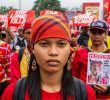Government�s Special Investigation Approaches Deadline With No Clear Results
NEW YORK � As a Philippine government task force nears its October 7 deadline to solve a number of high-profile killings, it has made little visible progress amid a climate of fear and a lack of cooperation by military authorities, Human Rights Watch said today.
Since February, dozens of killings, many widely thought to be politically motivated, have taken place. None of the recent cases have been brought to trial yet and only a handful of cases have been filed.
The special 10-week investigation, headed by Task Force Usig, began August 1 when President Gloria Macapagal Arroyo instructed the Department of Justice and the Philippine National Police to jail suspects in at least 10 killings before the October deadline. At the time, President Arroyo said, �I continue to condemn media and leftist killings in the strongest terms, and I have ordered law enforcement to dig deeper into the motives involved.� No updates on Task Force Usig�s or other authorities� efforts have been made public, however.
�The government�s special investigation in the killings must be effective. Otherwise, justice is in jeopardy in the Philippines,� said Sophie Richardson, deputy Asia director at Human Rights Watch. �Prompt and thorough investigations, credible prosecutions and public access to justice should be the norm, not the exception.�
Human Rights Watch�s research in the Philippines has uncovered deep public distrust in the government�s investigative effort, widespread fear among witnesses and victims� families, and a climate of fear in areas where the killings have occurred. Witnesses and victims� families interviewed by Human Rights Watch said they expect no real results from the investigations, and impunity for those involved in the killings.� Families have told Human Rights Watch that they are afraid to cooperate with police for fear of becoming targets of reprisal.
Key Philippine institutions appear to be unwilling or unable to address systemic problems. Police told Human Rights Watch that in some cases where they suspect military involvement, they are unable to receive cooperation from military authorities in their investigations. The government�s Commission on Human Rights said that it can only respond to complaints and that it has no independent powers to initiate investigations or prosecutions.
�It�s not surprising that Filipinos are losing confidence in their country�s security forces and government,� said Richardson. �Not only is the government failing to provide real protection and redress for ordinary citizens, it hasn�t even acknowledged that the system needs fixing.�
Government officials say that investigations are ongoing. But in some cases, Human Rights Watch has found that police brought charges against suspects whose identities and whereabouts are unknown, or shied away from pursuing credible leads when they indicated the involvement of military personnel in the killings. In other instances, police provided misleading information to victims� families. In at least one case, a police officer at the scene of a shooting failed to intervene to protect the victim or to pursue the perpetrator.
Human rights groups, local church leaders and politicians in the Philippines have repeatedly raised concerns about the impact on noncombatants of a government policy of �all-out war� declared against communist insurgents in June. Leftist leaders say many of the killings targeted leaders of legal political parties that the military claims are allied with the communist movement.
Human Rights Watch called on the Philippine government to restate its commitment to the rule of law. Specifically, the government should publicly instruct military officers to cooperate in police investigations, speed up processing of Witness Protection Program applications, and publicly oblige military units to refrain from targeting civilians in counterinsurgency efforts.
�The government�s rhetoric must now be matched by concrete action,� said Richardson. �Too many people are getting away with murder.�
For more information, please contact:
�
In New York, Sophie Richardson: +1-212-216-1257; or +1-917-721-7473 (mobile)
In London, Brad Adams: +44-79-0872-8333 (mobile)
Extrajudicial Killings









